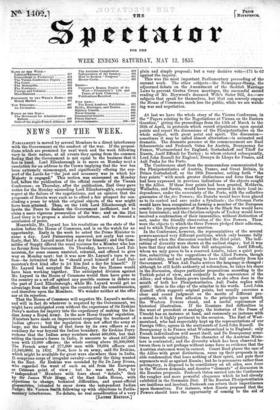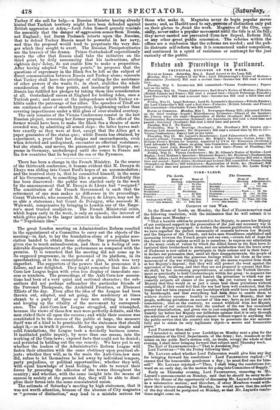At last we have the whole story of the Vienna
Conference, in the "Papers relating to the Negotiations at Vienna on the Eastern Question," giving the proceedings from the 15th of March to the 26th of April, in protocols which record stipulations upon special points and report the discussions of the Plenipotentiaries on the whole subject, with great point and spirit. The discussion— sometimes it may be called almost altercation—is animated and dramatic. The dramatis personae at the commencement are Buol Schauenstein and Prokesch Osten for Austria, Bourquenay for France, Westmoreland for England, Gortschakoff and Titoff for Russia, Aarif Effendi for Turkey ; to whom entered subsequently, Lord John Russell for England, Drouyn do Lhuys for France, and Aali Pasha for the Porte.
The Conferences start from the memorandum communicated by the Plenipotentiaries of Austria, France, and Great Britain, to Prince Gortschakoff, on the 28th December, setting forth " the four points" with much greater distinctness and force than they had been expressed in previous indications of the objects sought by the Allies. If these four points had been granted, Moldavia, Wallachia, and Servia, would have been secured in their local in- dependence, under the suzerainty of the Porte, with the collective guarantee of the five Powers; the Danube would have been placed as to its control and care under a Syndicate ; the Ottoman Porte would have been recognized as forming a member of the European comity ; the preponderance of Russia in the Black Sea would have been terminated; and the Christian subjects of Turkey would have received a confirmation of their immunities, without distinction of sect, under the friendly observation of the five Powers. These were the objects to which the three Powers pledged their adhesion, and to which Turkey gave her sanction.
In the Conference, however, the representatives of the several powers assumed very different positions, which only became fully developed when the discussion reached the third point. The indi- cations of diversity were shown at the earliest stages ; but it was here that they started into their full antagonism. Aarif Effendi, whom we may guess to be a reserved Asiatic, takes a quiet posi- tion, submitting to the suggestions of the Allied Powers, though not slavishly, and not professing to have full authority from his Government. When Aali Pasha arrives the language is changed : although •he still holds authority ad referendum, he takes his share in the discussion, shapes particular propositions according to the Turkish point of view, and evidently to the convenience of the Allies ; and when Russia grows insolent, as she often does in the mouth of both her Plenipotentiaries, Aali Pasha replies with spirit : there is the edge of the scimitar in his words. Lord John. Russell often suggests original points, but usually exercises a clear and soundjudgment on the merits of different pro- positions, with a firm adhesion to the principles upon which the Western Powers stand, and a useful copiousness of historical illustration. If the Russians find difficulties in the want of precedent or analogy, the historian of the Peace of Utrecht has an instance at hand, and commonly an instance with a moral to it highly pertinent to the occasion. The Earl of West- moreland, who had respectably kept up the representations of our Foreign Office, agrees in the sentiments of Lord John Russell. De Bourquenay is to France what Westmoreland is to England; only French individualism will assert itself, and De Bourquenay some- times hazards originality. The character of the Austrian Minis- ters is contrasted; and the diversity which has been observed be- tween them is not perhaps without some force as evidence that the Austrian statesmen were in earnest. Count Buol places the case of the Allies with great distinctness, sums up their proposals in an able condensation that loses nothing of their spirit, and puts their arguments well as against Russia; but he is persuasive rather than peremptory, is disposed to be conciliatory on all sides, sees force in the Western demands, and descries "elements" of discussion in the Russian proposals. Prokesch Osten carried into the Conference the rougher and more powerful eloquence which he had already exhibited in the Germanic Diet. If the Russian Plenipotentiaries are insidious and insolent, Prokesch can return their impertinence upon themselves. For instance, when Russia proposed that the Powers should have the opportunity of coming to the aid of Turkey if she call for help,—a Russian Minister having already' hinted that Turkish territory might have been defended against British aggression at Aden,—Lord. John Russell gravely reminds the assembly that the danger tif„aggression comes.from Russia, not England ; but Baron Prokesch retorts .upon tthe Russian, that to defend Turkey _Russia must be powerful in her navy, and thus the proposal would tend to perpetuate the very dan- ger which they sought to avert. The Russian Plenipotentiaries are the bravoes of the drama. Prince Gortschakoff superciliously meets the offer that Russia shall take the initiative on the third point, by drily announcing that his instructions, after eighteen days' delay, do not enable him to make a proposition. After having adopted "the four points," he proposes that the questions of supremacy in the Black Sea be left as the subject of -direct communication between Russia and Turkey alone; consents that Turkey shall have the privilege of calling for the assistance of other powers if she wants it ; in short, stultifies the whole consideration of the four points, and insolently pretends that Russia has fulfilled her pledges by taking them into consideration at all. Gortschakoff sneers at England for holding Aden, once a Tnikish post; and sneers at the independence which Turkey ex- hibits under the patronage of her allies. The speeches of Tit,off are one continued sneer of smooth hypocrisy, heightening. rather than covering impertinence under a thin gloss of over-studied courtesy.
The only remains of the Vienna Conferences consist in the last Russian project, reversing her former proposal. The effect of the former would have been to make the Black Sea a theatre of more crowded war, by admitting all armed ships : the latter leaves mat- ters exactly as they were at first, except that the Allies get a paper guarantee of the status quo ; while Russia has obtained, by experiment, a proof that her designs and encroachments, even when detected and undisguised, encounter no effectual resistance; but she stands, and moves, the paramount power in Europe, su- preme in Germany, unchallenged. until she comes to France and the few countries that lie beyond the sea or the Pyrenees.



























